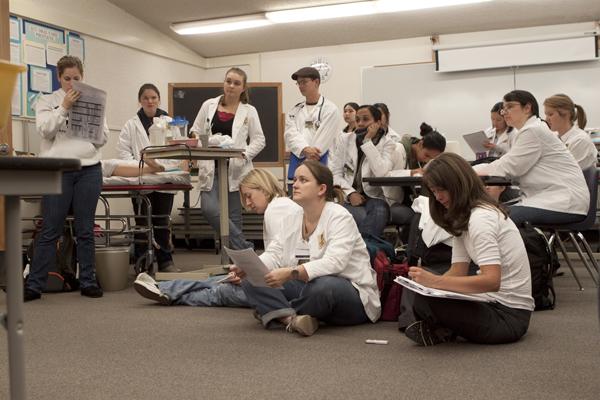Overcrowding impacts nursing students

nursing:Nursing students crowd into a classroom in El Dorado Hall to work on a simulation dummy. A grant from the Doyle Foundation will provide more space for learning.:File Photo
October 14, 2009
Student enrollments in nursing programs in California have increased over the last few years, but shortage of well-trained nurses remains a problem because of budget cuts to higher education.
California colleges and universities will need to graduate more than 40,000 nurses within the next decade to meet projected demand, according to a report from the Legislative Analyst’s Office.
However, because of the budget crisis, funds needed to expand or maintain nursing programs in state universities and community colleges are either cut or unchanged, said Sara Bachez, consultant for the Assembly Budget Committee.
“In this budget year, we didn’t treat any program differently,” Bachez said. “Everyone took a hit.”
This year, funding for California State University nursing programs remained at $6.2 million, Bachez said. This reduces the likelihood of expanding the programs.
Historically, Sacramento State has not been able to accept all qualified applicants to the nursing program due to limited numbers of qualified professors, facilities and placements in clinics and hospitals.
“We have plenty of students who want to become nurses, but we just don’t have the capacity to take them all,” said Ann Stoltz, chair of the division of nursing.
Since fall 2007, Sac State only admits 60 applicants from a pool of about 400. In fall 2009, 204 qualified students were not admitted.
Stoltz said the division of nursing is not yet sure how the budget will affect the program, and the university has not suggested cutting enrollments.
“They know the reality of it. They’re, of course, disappointed,” Stoltz said. “What we tell our students is just apply everywhere.”
Applicants must complete all prerequisite courses with a grade of C or better and with a minimum grade point average of 3.0. Starting in fall 2010, the minimum grade point average requirement will be raised to 3.3.
Students can only take upper division courses once they are admitted into the program. Students are ranked based on their grade point averages, and only the top 60 are admitted.
Because of this, other students, after completing all the prerequisites for the nursing program, often change their majors because they could not get in the program.
The kinesiology and health science department, for instance, has several students who were previously in the prenursing program.
“We tend to get a lot of change of major and majority (of the students) are prenursing majors,” Baldini said. “The nursing program is very competitive. Even students with a high GPA don’t get in.”
Senior Erin DeGoede started prenursing as a freshman, but decided to shift to health science.
“I had all the prerequisites and general education done,” DeGoede said. “I applied to the nursing program but didn’t get in because my GPA is not high enough.”
DeGoede said she’ll wait until she graduates and apply to a nursing program at another university.
While funds for the CSU system’s nursing programs remain the same this year, funds for California community colleges went from $22 million last year to $18.5 million this year, a 16 percent reduction, Bachez said.
Susie Williams, associate vice chancellor for research and communications at the Los Rios Community College District, said the district partnered with major health care providers to expand their nursing programs.
“This partnership has allowed us to more than double the number of nursing students in our program,” Williams said.
California community colleges graduate 70 percent of registered nurses in California.
Community colleges in the area, such as the American River College, Sacramento City College and Sierra College, offer associate’s degree in nursing, which enable students to become registered nurses.
Stoltz said it’s important for students to be able to get their bachelor’s degrees in nursing because doing so provides career advancement.
“It’s very important that we provide the trajectory from associate’s degree in nursing to master’s degree in nursing, and we’re the only way they (students) can get that,” Stoltz said.
Kristine Guerra can be reached at kguerra@statehornet.com































































































































